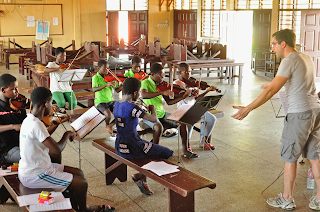Mozambique Police and Rach 3
These days I found myself driving in Mozambique. Great road conditions, surprisingly, and majestic lush scenery, with overflowing tropical vegetation, rivers, and lagoons. My hired car, a black Toyota Corolla, for which I was overcharged, and which was probably shipped over to Mozambique from Japan, when it had run too many miles to be worth anything, was driving great. Overall, I was ecstatic how smooth my first self driving experience in Africa was going, until, about four hours out of Maputo, I was stopped by the police. I had been warned about police in these parts, so when I was asked to secure the car and follow them, I stock up with patience and an idiotic touristy smile, and walked out of the car.
I had been driving too fast. They had evidence, they showed
me a picture with numbers. This was a town, I was told, a residential road. I
looked at the forest up and down the road, not a house to be seen. I knew there
was not much point in discussing this, but I tried to make a point that I
thought this was a highway, as it had been for the last four hours, and that I
am always a very careful driver. The young officer, who was fluent and humorous
in English, jumped to the point: “In your country, how much to you have to pay
when you drive too fast?”. There was no point in trying to explain to him that
when I passed my driving exam in Greece, speed limits was a subject for the
theory test, that it was as likely to find people driving in super-sonic jet
speeds in the centre of town, as it was to have someone in the fast lane of a
highway competing with a Paralympic turtle champion. I couldn’t explain to him
either that in my country, at least when I learned to drive, it wasn’t a matter
of how much the fine would be, but of how long. How long till you find someone
that knows someone, whose cousin is married to someone that will talk to his
friend who will erase the penalty. But I was in Mozambique however, so my best
defence was a smile.
The police officer, likely wanting to practice his English,
seemed to enjoy the conversation, and perhaps even wanted to dazzle his
impatient colleagues. After a short deliberation between them, I was informed
that the fine would be 4,000 Metikal (about 130 USD), and I was shown a chart
with the fines. “What can you offer us? How can you apologise?”, I was asked by
the young policeman, with an innocent smile, while seemingly untouched by any
response from me. “I can say I am really sorry and it won’t happen again. I
will be even more careful.” He turned to his colleagues and they all laughed to
hear that I was offering an apology by saying “I am sorry”. I was strategically
omitting to mention the fact that I can communicate in Portuguese, hoping this
will come to my advantage at some point.
“I don’t have any money I am afraid, but I can offer a CD. I
am a musician, and as an apology I can give my music.” I was expecting anger as
patience would grow thinner, or at least even more laughter, but to my
surprise, they seemed to like the idea. “But we need four CDs. We don’t all
live in the same house!” Not a problem. I ran to the car and right in the
middle of the Mozambique countryside I brought back the gift of Rachmaninov 3rd
Piano Concerto to four excited police officers.
“We are glad to support a foreign artist,” I was with goodbyes. Pity I didn't autograph them, I thought walking back to the car.


Comments
Post a Comment